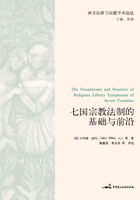Ath. Up to the age of three years, whether of boy or girl, if aperson strictly carries out our previous regulations and makes thema principal aim, he will do much for the advantage of the youngcreatures. But at three, four, five, and even six years the childishnature will require sports; now is the time to get rid of self-will inhim, punishing him, but not so as to disgrace him. We were sayingabout slaves, that we ought neither to add insult to punishment soas to anger them, nor yet to leave them unpunished lest they becomeself-willed; and a like rule is to be observed in the case of thefree-born. Children at that age have certain natural modes ofamusement which they find out for themselves when they meet. And allthe children who are between the ages of three and six ought to meetat the temples the villages, the several families of a village unitingon one spot. The nurses are to see that the children behave properlyand orderly-they themselves and all their companies are to be underthe control of twelve matrons, one for each company, who areannually selected to inspect them from the women previously mentioned,[i.e., the women who have authority over marriage], whom the guardiansof the law appoint. These matrons shall be chosen by the women whohave authority over marriage, one out of each tribe; all are to beof the same age; and let each of them, as soon as she is appointed,hold office and go to the temples every day, punishing alloffenders, male or female, who are slaves or strangers, by the help ofsome of the public slaves; but if any citizen disputes the punishment,let her bring him before the wardens of the city; or, if there be nodispute, let her punish him herself. After the age of six years thetime has arrived for the separation of the sexes-let boys live withboys, and girls in like manner with girls. Now they must begin tolearn-the boys going to teachers of horsemanship and the use of thebow, the javelin, and sling, and the girls too, if they do not object,at any rate until they know how to manage these weapons, andespecially how to handle heavy arms; for I may note, that the practicewhich now prevails is almost universally misunderstood.
Cle. In what respect?
Ath. In that the right and left hand are supposed to be by naturedifferently suited for our various uses of them; whereas no differenceis found in the use of the feet and the lower limbs; but in the use ofthe hands we are, as it were, maimed by the folly of nurses andmothers; for although our several limbs are by nature balanced, wecreate a difference in them by bad habit. In some cases this is ofno consequence, as, for example, when we hold the lyre in the lefthand, and the plectrum in the right, but it is downright folly to makethe same distinction in other cases. The custom of the Scythiansproves our error; for they not only hold the bow from them with theleft hand and draw the arrow to them with their right, but useeither hand for both purposes. And there are many similar examplesin charioteering and other things, from which we may learn thatthose who make the left side weaker than the right act contrary tonature. In the case of the plectrum, which is of horn only, andsimilar instruments, as I was saying, it is of no consequence, butmakes a great difference, and may be of very great importance to thewarrior who has to use iron weapons, bows and javelins, and thelike; above all, when in heavy armour, he has to fight against heavyarmour. And there is a very great difference between one who haslearnt and one who has not, and between one who has been trained ingymnastic exercises and one who has not been. For as he who isperfectly skilled in the Pancratium or boxing or wrestling, is notunable to fight from his left side, and does not limp and draggle inconfusion when his opponent makes him change his position, so inheavy-armed fighting, and in all other things if I am not mistaken,the like holds-he who has these double powers of attack and defenceought not in any case to leave them either unused or untrained, ifhe can help; and if a person had the nature of Geryon or Briareus heought to be able with his hundred hands to throw a hundred darts. Now,the magistrates, male and female, should see to all these things,the women superintending the nursing and amusements of the children,and the men superintending their education, that all of them, boys andgirls alike, may be sound hand and foot, and may not, if they canhelp, spoil the gifts of nature by bad habits.















